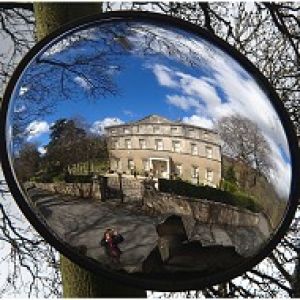Troubled
I hadn't realised that Troubles Tourism would be difficult on a coach holiday from the UK to Northern Ireland.. Dinner conversations can be awkward. We sat with a Laotian couple from Kent who are interesting, but I found it hard to understand every word they said, with background noise competing. Another woman who had not been on our coach but is with another group tour has Republican relatives in Cookstown. After my companion Kitty mentioned having lived near a high security prison where IRA prisoners were held during the hunger strikes of 1981, she seemed to think we were 'on the other side'.It feels as if I'm walking on glass, I'm afraid to speak out loud.
We started our day by driving to the Giant's Causeway. Then on to the City of Derry/Londonderry, where a Blue Badge guide boarded our coach. Only trained Blue Badge guides with lived experience of the Troubles are allowed to guide inside Derry/Londonderry. It is part of the oeace and reconciliation process. Our own guide, Camilla, had been careful not to tell us anything about Derry before we got there. I'd sussed out her leanings because she called the city Londonderry, seemed to like the UK Royal Family, and had relatives who had fought for the Allies during World War II. Back then, she said, those deeds were hushed up. The Irish Free State had been created in the wake of the 1916 Easter Uprising, and the European war was not theirs to fight. However, just before our guide got on board our coach, our guide said to our driver in an aside ' I hope he's not a mad Republican'.
Our guide, it turned out, was the descendants of Scottish planters (protestants) and Irish Catholics. His parents married for love, across the divide, and he was raised in the Catholic Bogside area. He was a Republican, for sure, but definitely not mad.
We toured around the top of the hill overlooking Derry, both the Catholic and protestant areas, looking down over the river and Co. Donegal beyond. Cecily Francis Alexander came from Derry, and wrote the hymn 'There is a green hill far away, without a city wall' (without means outside, in this case).
From there we went back into the centre, to the railway station where the first Catholic civil rights marches were held, and on to Catholic Creggan and the Bogside areas, and the small Protestant area too. A peace wall stands here, but it's lower than in Belfast, and there feels more commitment to the peace process. The murals on gable ends in both areas are striking. It was in the Bogside that the events of Bloody Sunday erupted, when British paratroopers shot dead 13 Irish Catholics in January 1972. Enquiry after enquiry followed, cover up after cover up, but it was not until David Cameron's government was in power in Westminster that a belated apology was issued. What use is an apology, 35 years later?
By the time the tour ended, I felt crushed by the weight of history. Almost couldn't breathe. Kitty went off to walk the city walls, and I wandered around in a daze before finding some postcards to write, and a cafe table at which to write them.
The journey back was long. It is going to take me weeks or months to process all of this. To see that Unionists not only exist, but paint their paving stones and their lamp posts red, white and blue, is a revelation. Nothing in my Irish Catholic upbringing in Dublin or the Highlands of Scotland has prepared me for this moment. There is another side. They really do exist. They, too, want to be seen and heard. If not today, they will share their story another time.
Collage: top: Gable end in Bogside
Middle: me looking wet, with Dunluce castle behind
Bottom: Giant's Causeway

Comments
Sign in or get an account to comment.


